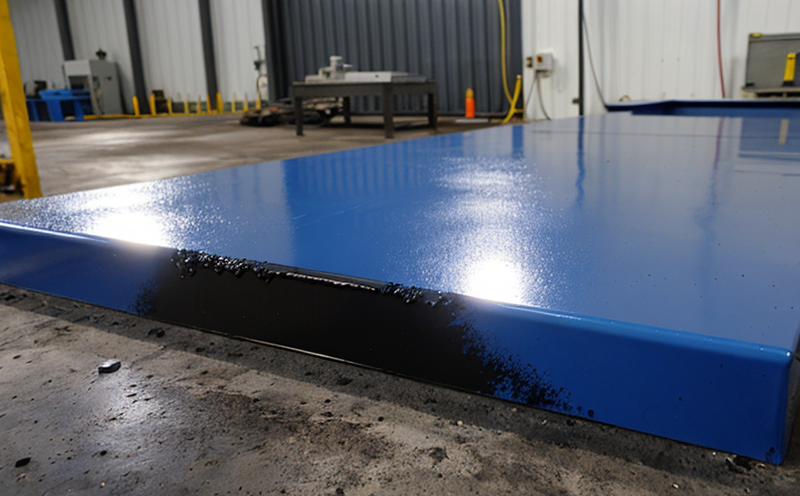ASTM B504 Coating Thickness by Coulometric Method
The ASTM B504 standard specifies a method to determine the thickness of organic coatings on metallic substrates using the coulometric technique. This non-destructive testing (NDT) approach is particularly useful in quality assurance, compliance verification, and research & development contexts within metallurgy and material science.
The process involves placing the coated specimen into an electrolytic cell where it acts as a cathode. A known current is passed through the solution, causing coating ions to be deposited on a reference electrode. The amount of charge required for complete deposition provides a direct measure of the thickness of the coating. This method offers high accuracy and repeatability, making it suitable for precision applications.
ASTM B504 is widely recognized for its reliability in determining coating thicknesses ranging from submicrometers to several micrometers. It's particularly valuable when dealing with thin films or layers that are critical to the performance of the material. The standard ensures consistency across different laboratories, which is crucial for international projects and regulatory compliance.
Preparation of specimens prior to testing includes ensuring the surface is clean, dry, and free from contaminants that could affect the test results. It's essential to follow ASTM B504 guidelines meticulously during this phase since improper preparation can lead to inaccurate measurements.
The instrumentation used for ASTM B504 typically consists of a coulometric thickness gauge, a potentiostat, an electrolyte solution, and reference electrodes. The choice of these components is crucial as they directly influence the accuracy and precision of the results obtained.
Following the test, detailed reports are generated that include raw data, calculations used to determine coating thickness, and any relevant notes or observations made during the testing process. These documents serve as critical records for quality control, regulatory compliance, and research purposes.
- International Acceptance: ASTM B504 is internationally recognized for its accuracy and reliability. It's accepted in numerous countries including the United States, Europe, Asia, and Australia. Compliance with this standard ensures that the coating thickness measurements are consistent across borders.
The method described by ASTM B504 finds applications in various industries such as automotive, aerospace, electronics, and construction where precise control over surface coatings is essential for ensuring product performance and safety.
Why It Matters
Accurate measurement of coating thickness is paramount in many industrial sectors. In the automotive industry, for instance, thin but durable paint layers contribute significantly to vehicle aesthetics and corrosion resistance. Ensuring that these coatings meet specified thickness requirements helps manufacturers comply with safety standards and customer expectations.
In aerospace applications, where materials must withstand extreme environmental conditions, precise coating thickness is crucial for maintaining structural integrity and preventing premature failure. Similarly, in the electronics industry, thin protective layers on circuit boards are vital for ensuring reliable operation and longevity of devices.
From a regulatory standpoint, compliance with standards like ASTM B504 ensures that products meet national and international safety norms. This not only protects consumers but also facilitates smoother trade across different jurisdictions. In research & development environments, accurate coating thickness measurements enable scientists to optimize material properties and improve product design.
The reliability of the results provided by ASTM B504 is enhanced through rigorous calibration procedures and adherence to strict quality control measures. These practices ensure that every measurement adheres to international standards, thereby fostering trust among stakeholders involved in the production process.
Eurolab Advantages
At Eurolab, we pride ourselves on providing comprehensive metallurgical and material testing services tailored specifically for your industry's needs. Our team of experts ensures that all tests conducted meet or exceed international standards such as ASTM B504.
- Expertise: With years of experience in the field, our technicians are well-versed in handling complex materials and challenging specimens.
- State-of-the-Art Equipment: We utilize advanced instrumentation capable of delivering precise measurements even for very thin coatings.
- Rigorous Quality Control: Our processes adhere strictly to ASTM B504 guidelines, guaranteeing accurate and reliable results.
- Comprehensive Reporting: Beyond simple numerical outputs, our reports offer detailed insights into the test procedures employed ensuring full transparency.
By choosing Eurolab for your coating thickness testing needs, you can rest assured that your products will meet stringent quality and safety criteria. Our commitment to excellence ensures that every project receives personalized attention and expert handling from start to finish.





